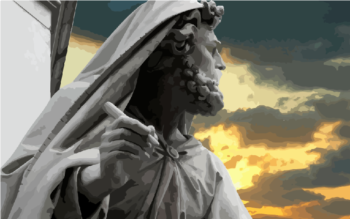By Mark Ellis –

Let every soul be subject unto the higher powers. For there is no power but of God: the powers that be are ordained by God. (Romans 13:1)
When Paul wrote his letter to the Romans, Nero was emperor, and Nero’s infamous reign ultimately involved the active persecution of Christians – including burning them as human torches to light his garden and feeding them to lions.
How could Paul say believers should be subject to corrupt, deranged political leaders guilty of horrible offenses?
“You might not respect the person who is in power, but you must realize the Lord has ordained him or her to be there – even if it’s a person as brutal as Caesar Nero – or Adolph Hitler,” notes Jon Courson, in his excellent Application Commentary.
Surely Hitler would be one exception to Paul’s teaching in Romans!
Courson, however, makes the case that the modern state of Israel would never have been born if world sentiment aroused by Hitler’s atrocities had not created sympathy toward the Jewish people.
“As World War II came to a close, newsreels showed the bodies of Jews being bulldozed into ditches, the mounds of glasses, false teeth, and shoes producing horror in the heart of humanity. And so it was, that, although it went right down to the wire, the League of Nations voted in favor of the establishment of the nation of Israel.”
Christians may often miss the bigger picture of what God may be unfolding in human events, to fulfill prophecy and usher in His return.
“That’s why I don’t lose sleep over the political situation – for while I pray for those in authority over us, and while I want to see salt and light have an effect in the society, I know God says all power is ordained by Him,” Courson notes.
Due to the way prophetic events unfold, Courson sees the disintegration of society as inescapable (Matthew 24:37). Having this perspective should cause believers to re-examine their priorities. How much time should be spent polishing the deck chairs on the Titanic versus saving the passengers?
“I challenge you to at least consider where in the New Testament you hear an exhortation or see an example of political mobilization of the church…We’re to be ministers of reconciliation rather than ministers of confrontation.”
At the time Jesus ministered on the earth, there was government corruption, abortions (or infanticide), and rampant moral depravity. How did Jesus respond?
“It was not the goal of Jesus, Paul or the early church to change the world temporarily. No, their focus was on the kingdom eternally,” Courson observes.
Idolizing charismatic political figures is also a trap for the church. “God knows when He uses someone who is impressive in the eyes of the world, people set themselves up for a huge fall because they look to him rather than to God. Therefore, he says, ‘I don’t want any flesh to glory because all flesh will fail ultimately.’
“It was not until Uzziah died that Isaiah saw the Lord high and lifted up (Isaiah 6:1). Who was Uzziah? One of the most powerful, successful, gifted kings in the history of Judah and Israel. Uzziah increased the boundaries of the nation, ushered in economic prosperity, and invented war machinery. Yet although his name was on the lips of all people (2 Chronicles 26:8), it wasn’t until he died that Isaiah saw the Lord.

“The Lord still allows people to die – not physically – but in the estimation of others in order that our focus can more clearly be upon Him. It’s a reason to say, ‘Once again, Lord, I see that You are the only One upon whom I can truly and totally rely.’”
Jon Courson’s Application Commentary by Jon Courson Copyright © 2003 by Jon Courson. To order, go here



